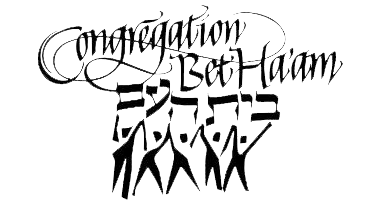by Lynn Urbach, President
I just got back from the Union for Reform Judaism (URJ) Biennial in Chicago. What an incredible, exciting five days it was!
Over 5,000 Jews and friends of Jews learning, singing, praying, and celebrating Shabbat together. While not all attendees are synagogue leaders, I took the opportunity to network with other leaders and learn about all things synagogue. I went to sessions about the future of synagogues, about how to engage people of all ages both inside and outside our physical walls, and about what good leadership looks like. There were several plenaries with leaders from the Reform Movement and from Muslim and Christian communities, one with the governor of Illinois, and one with Second City (a well-known Chicago comedy club). There was music galore, usually going until 11:00 p.m., way past my bedtime.
BACKGROUND: CONGREGATION BET HA’AM BELONGS TO THE UNION FOR REFORM JUDAISM (URJ), THE UMBRELLA ORGANIZATION FOR NORTH AMERICAN REFORM JUDAISM. THE URJ IS COMPOSED OF ABOUT 850 REFORM CONGREGATIONS, THE NATIONAL FEDERATION OF TEMPLE YOUTH (NFTY), URJ CAMPS, THE ASSOCIATION OF REFORM ZIONISTS OF AMERICA (ARZA), HEBREW UNION COLLEGE (HUC-JIR, THE JEWISH SEMINARY WHICH RABBI SAKS ATTENDED), AND A NUMBER OF OTHER ORGANIZATIONS.
At each Biennial, the URJ considers resolutions to adopt. These resolutions are usually submitted by one or more member congregations, are vetted by a committee, and are voted on by member congregations, with each congregation getting a number of votes proportional to the number of its congregants.
These resolutions include topics from religion to civil rights, children, and things international. Their history reflects the evolution of the URJ’s stances on many political, social, economic, and humanitarian issues.
At this year’s Biennial, all four proposed resolutions passed by voice vote. Each resolution was accompanied by information about the issue and its basis in Jewish text and tradition. Of note, our board was not unanimous in support of all of these. The resolutions passed in 2019 (the titles are links to the texts):
Resolution on Supporting Those Affected by the Opioid Crisis
This resolution advocates addressing substance use disorder as a matter of health, and not as an issue of criminality, urges congregations to work to end the stigma around this disorder, and encourages education and government action.
Resolution on the Study and Development of Reparations for Slavery and Systemic Racism in the U.S.
This resolution advocates for the creation of a federal commission to study reparations to redress the effects of slavery and subsequent discrimination against Black Americans. It encourages congregations consider actions to address the impact of this history.
This resolution urges federal and state governments to phase out the use of private prisons and detention centers.
Resolution on U.S. Labor in the Early 21st Century
This resolution supports worker dignity and morally just labor and compensation practices and urges Reform congregations to adopt employment and contracting practices to reflect such values.
Please reach out to me or another Board member if you are interested in following up on any of these resolutions in our community.
Photo by Priscilla Du Preez on Unsplash

